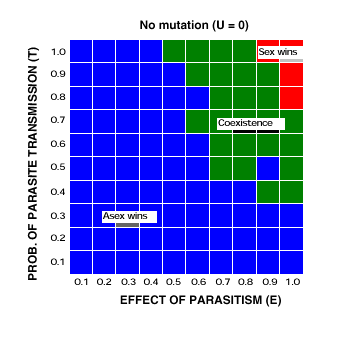Evolution and Sex
![]()
There
are over 20 theories on sex6 including the Red Queen hypothesis, Muller's
Ratchet, and the deleterious mutation hypothesis.
The
deleterious mutation hypothesis and the Red Queen hypothesis dominate the
debate over why sex persists3. The deleterious mutation hypothesis was briefly
discussed under Asexual Disadvantages.
The
Red Queen hypothesis proposes that species locally adapted are in an "arms
race" with each other. Although it applies to many different interactions,
the Red Queen hypothesis will be explained here in the context of host/parasite
interactions. A few assumptions:
- Parasite generation times are shorter than
host generation times.
- Usually focused on binding proteins.
- Host susceptibility and parasite infectivity
polymorphisms are genetically correlated7.
Sexual
reproduction introduces recombination as a method to increase variability.
Both sexual and asexual populations may have locally adapted resistance alleles
against a particular parasite's infective alleles, but sexual populations
retain unfavored genes for future use. Parasites have "keys" for
particular host "locks."
- The most common host phenotype should be
disproportionately infected by parasites because the parasites are locally
adapted to them.
- Heterozygotes retain binding sites that
are not adapted for by the current parasite population.
- Highly inbred sexual host populations and
asexual population lose heterozygosity and polymorphisms.
The
mutation rate of the parasites and hosts, and the virulence of the parasites
determine if the asexual advantages outweigh the sexual ones.

In this example, the asexual advantages easily overcome the effects of parasitism except in extreme situations8.
Asexual
populations always win when disease or parasites are not a great issue. Computer
models8 show that when disease
or parasitism become more prevalent, sexual population often win.
![]()
The
Red Queen hypothesis takes its name from Lewis Carrol's Through the Looking
Glass. Alice runs as fast as she can after the Red Queen, but neither
of them moves. This perplexes Alice, and the Red Queen responds, "Now,
here, you see, it takes all the running you can do to keep in
the same place"9. The host-parasite interaction
is in the same fashion. Although they may both be perfectly, or near perfectly
adapted, they cannot stop evolving. Mutation assures that the parasite will
eventually be able to attack the host, so the host must continually evolve
new means of resistance10.
![]()
|
Red Queen |